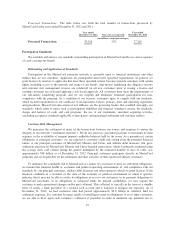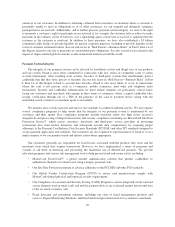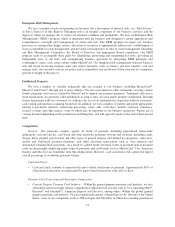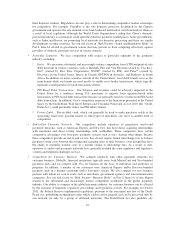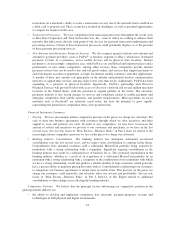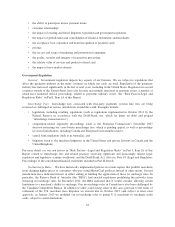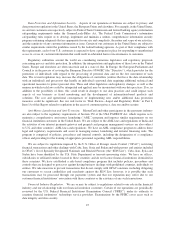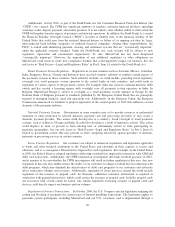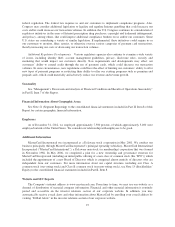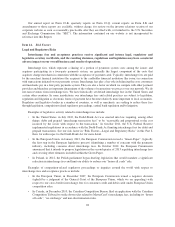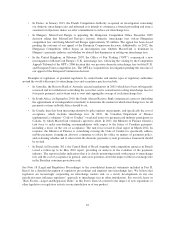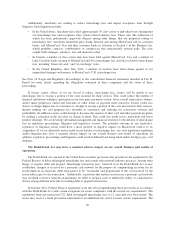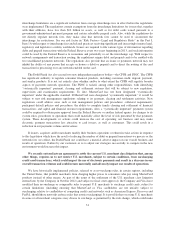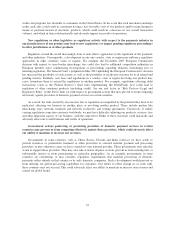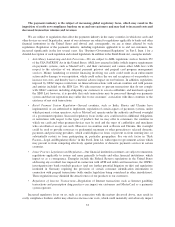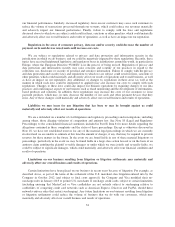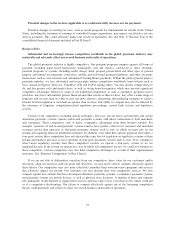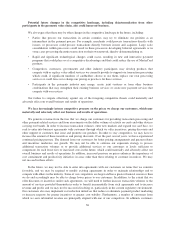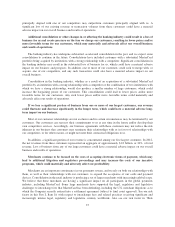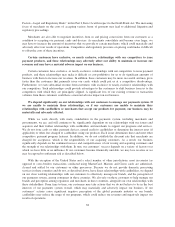MasterCard 2012 Annual Report Download - page 33
Download and view the complete annual report
Please find page 33 of the 2012 MasterCard annual report below. You can navigate through the pages in the report by either clicking on the pages listed below, or by using the keyword search tool below to find specific information within the annual report.• In France, in January 2013, the French Competition Authority re-opened an investigation concerning
our domestic interchange rates and informed us it intends to commence a formal proceeding and issue a
statement of objections unless we offer commitments to reduce our interchange fees.
• In Hungary, MasterCard Europe is appealing the Hungarian Competition Office December 2009
decision ruling that MasterCard Europe’s historic domestic interchange fees violate Hungarian
competition law and fining MasterCard Europe approximately $3 million. The appeal has been stayed
pending the outcome of our appeal of the European Commission decision. Additionally, in 2012, the
Hungarian Competition Office began an investigation into whether MasterCard is dominant in
Hungary’s payments industry and whether we abused that dominance in setting our interchange fees.
• In the United Kingdom, in February 2007, the Office of Fair Trading (“OFT”) commenced a new
investigation of MasterCard Europe’s U.K. interchange fees, following the voiding by the Competition
Appeals Tribunal of the OFT’s 2006 decision that our previous domestic interchange fees violated U.K.
and European Union competition law. The OFT has suspended its investigation pending the outcome of
our appeal of the European Commission decision.
Examples of regulation, or potential regulation, by central banks and similar types of regulatory authorities
around the world with respect to interchange fees and acceptance practices include:
• In Australia, the Reserve Bank of Australia enacted regulations in 2002 (which have been subsequently
reviewed and not withdrawn) controlling the costs that can be considered in setting interchange fees for
four-party payment card systems such as ours and capping the average of such interchange fees.
• In South Africa, in September 2010, the South African Reserve Bank commenced a process (including
the appointment of an independent consultant) to determine the manner in which interchange fees for all
payments systems in South Africa should be set.
• In Canada, there has been increasing attention by policymakers on payments, and specifically the cost of
acceptance, which includes interchange fees. In 2010, the Canadian Department of Finance
implemented a voluntary “Code of Conduct” on related issues for payment card industry participants in
Canada, by which MasterCard voluntarily agreed to abide. In 2011, the Minister of Finance formed a
task force to make non-binding recommendations with respect to the future of Canadian payments,
including a focus on the cost of acceptance. The task force issued its final report in March 2012. In
response, the Minister of Finance is considering revising the Code of Conduct to specifically address
mobile payments, forming an advisory committee to advise his office on matters of payments policy,
and evaluating whether and to what extent the domestic payments system governance framework should
be revised.
• In Brazil, in December 2011, the Central Bank of Brazil (together with competition agencies in Brazil)
issued a follow-up to its May 2010 report, providing an analysis of the evolution of the payments
industry. The report includes indications that it is closely monitoring trends with respect to interchange
fees and the cost of acceptance in general, and raises questions about the impact of the no-surcharge rule
in the Brazilian consumer protection code.
See Note 18 (Legal and Regulatory Proceedings) to the consolidated financial statements included in Part II,
Item 8 for a detailed description of regulatory proceedings and inquiries into interchange fees. We believe that
regulators are increasingly cooperating on interchange matters and, as a result, developments in any one
jurisdiction may influence regulators’ approach to interchange fees in other jurisdictions. See our risk factor in
“Risk Factors—Legal and Regulatory Risks” in this Part I, Item 1A related to the impact of new regulations or
other legislative or regulatory activity in one jurisdiction or of one product.
29


